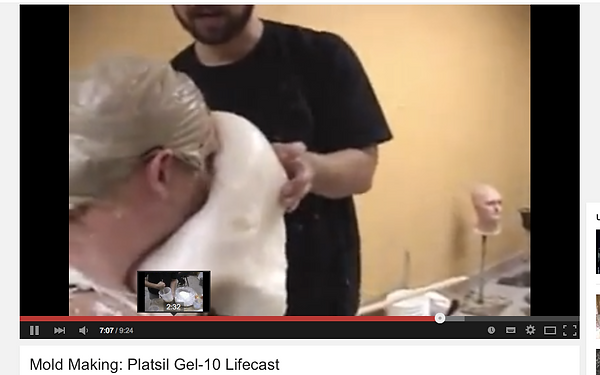


Brick In The Yard Mold Supply (2008) Mold Making: Platsil Gel-10 Lifecast [online] Available from:https://www.youtube.com/watch?v=qZH9MjD5pg8&spfreload=10 [Accessed: January 28th 2015]
Silicone Casting
Seeing as a plaster facecast cannot be used as part of a fibreglass mould, I am researching how create a fibreglass positive as part of the mould.
I don't know if fibreglassing straight into alginate is possible, but I know you can fibreglass into silicone. Originally I planned to buy some gocast for my face casting, but after watching this tutorial, I know that its possible with regular platgel 10.
Notes:
- 1st coat with normal silicone
- 2nd coat, mix in polyfibres to achieve a frosting like consistency which whill diminish the stretch of the silicone. Unlike cabosil it thickens the silicone and gives a stiffening quality to the rubber
- Build up to about three eights of an inch
- Then apply plaster the same as you would for an alginate mould
- -After its dry, remove the plaster and cut a line up the head for the removal of the silicone
- The silicone needs to be carefully coaxed off the face as it has more of a tendancy to stick to hairs than alginate
- Fill the nose holes with more of the silicone mix, ensuring it doesnt run and distort the mould
He didn't explain in-depth about using cabosil, or whether its a real option. I will ask my tutors, and if not, then I may buy some polyfibres and try this method instead of gocast.
He also did a video showing that the same method could be used for body casting as well.
© 2023 by Tennis Lessons with Karen. Proudly created with Wix.com